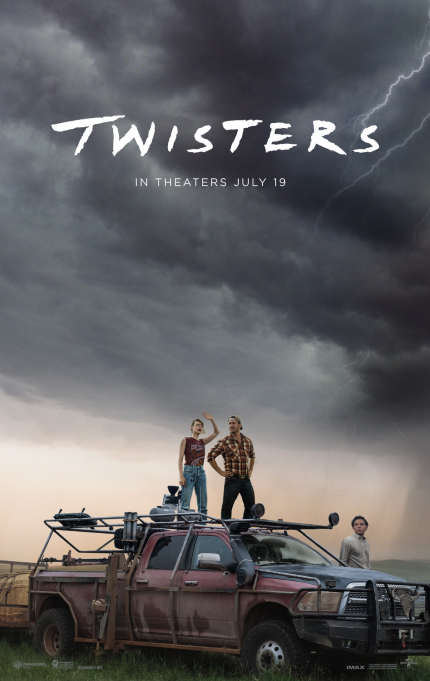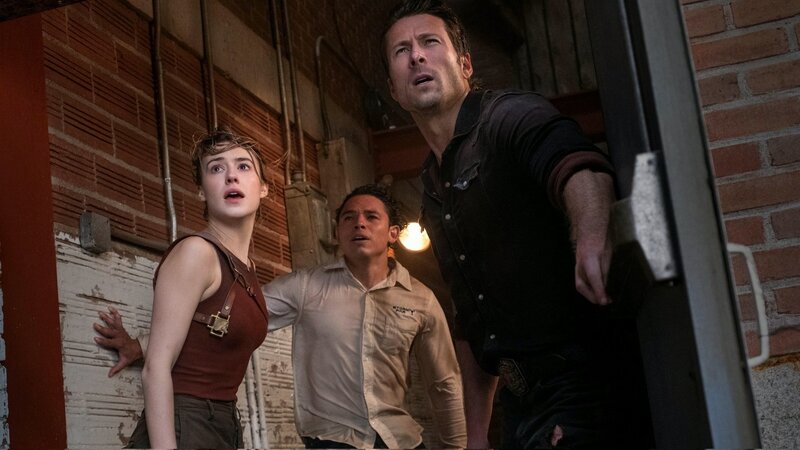TWISTERS Review: Lee Isaac Chung Channels His Inner Spielberg
Directed by Lee Isaac Chung, the new version stars Daisy Edgar-Jones, Glen Powell, and Anthony Ramos.

Legend has it that after writer-director James Cameron's The Terminator’s commercial and critical success, 20th-Century Fox executives invited Cameron to pitch them a sequel to the Ridley Scott-directed Alien, a post-Star Wars science-fiction/horror film considered a genre-redefining classic by the middle of the decade.
At the pitch meeting, an understandably confident Cameron jogged to the whiteboard and triumphantly added an “$” to the word “Alien.” Almost immediately, those same executives gave Cameron the thumbs up to write and direct Aliens, the rare sequel arguably equal to the original. [Note: Cameron has since confirmed the particulars of said pitch meeting, so it’s no longer legend; it’s now considered a fact.]
Although it took the better part of three decades and not six or seven years, something along similar lines must have likely happened when anonymous studio executives (or their in-house algorithm) decided to greenlit Twisters, the decades-in-development standalone sequel to the Steven Spielberg-produced, Jan de Bont-directed blockbuster of 1996, Twister.
Post-greenlight, though, Twisters still took a long and winding road to arrive at its ultimate destination (the world's movie theaters), most recently with filmmaker Joseph Kosinski (Top Gun: Maverick, Oblivion, Tron: Legacy) agreeing to write and direct the much-delayed follow-up to Twister, his departure over “creative differences” (Kosinski still receives a story credit), and the somewhat surprising arrival of Lee Isaac Chung (Abigail Harm, Munyurangabo), fresh from his Oscar-nominated success, Minori, to helm the big-budget, effects-heavy sequel.
Using the original as a rigid, inflexible template, occasionally to detrimental results, Twisters centers on all-new, but altogether familiar characters, Kate Cooper (Daisy Edgar-Jones, underserved by a rote, routine script), a meteorologist predictably haunted by a tragic, hubris-laden past, Tyler Owens (Glen Powell, the two-time, reigning Mr. Charisma Award winner), a smug, self-entitled hotshot storm-chaser with a million YouTube followers, and Kate’s university-friend-turned-fresh-faced-entrepreneur, Javi (Anthony Ramos).
It’s less a conventional romantic triangle than a purely functional, dramatic one, pitting a misunderstood good ole’ boy with the proverbial heart of gold against the ethically and morally compromised North-easterner Javi and the vulture capitalists who fund Javi’s work.
Like before, Twisters toggles between two storm-chasing teams, Javi’s corporate-sponsored, uniform-wearing, ultimately anonymous employees and Tyler’s colorful, rambunctious outsiders. Javi’s team is all about science and how to use science to help corporate capitalism minimize losses and expand revenue and profits.
Tyler and his vaguely defined team are driven more by the thrill of the storm chase, documenting said storm chase and its results, and funding their nomadic lifestyle via YT ads, sponsorships, and t-shirt sales. One side is root-worthy, and the other one isn’t. (It’s easy to guess which is which.)
Often bogged down in science- or pseudo-science speak, the plot turns on newfangled tech, courtesy of the U.S. military and thus, the American taxpayer, that, if deployed properly, can take the most detailed 3D imaging of a deadly, destructive tornado in action in human history. The first film’s sensor-driven MacGuffin, Dorothy (of course), makes an obligatory appearance, but it’s the 3D imaging device (or rather devices) that initially takes center stage, convincing Kate, a onetime “tornado whisperer” whose borderline daft experiment in tornado taming ended in the aforementioned tragedy, to leave the comforts and confines of New York City for Oklahoma and “Tornado Alley.”
Mark L. Smith’s (The Boys in the Boat, Overlord, The Revenant) slightly undercooked screenplay gives Kate, Tyler, and Javi predictably linear character arcs: Kate has to overcome a combination of survivor’s guilt and PTSD to save the day against increasingly destructive, semi-sentient tornadoes, Tyler has to shed his superficial smugness and show Kate, along with the audience, that he’s more than a collection of smiles, smirks, and tight t-shirts, while Javi, guided by the ethically pure Kate, must wake-up to the potentially negative real-world consequences of the choices he’s made.
As with the original, a series of tornados, each one more spectacular than the last, function as the central, if not the sole, reason for seeing a belated sequel. While Twister's visual effects, a near seamless blend of practical and CGI, still hold up almost three decades later, the latest iteration of onscreen, tornado-focused mayhem looks, sounds, and feels (almost) like the real thing, except from the remove of a plush seat in a darkened movie theater.
And “the real thing” — or some relatively close approximation — remains what contemporary audiences want from their sensory-driven theatrical experiences. Brains don’t have to be checked in at the door, but as expected, common sense does.
Twisters opens Friday, July 19, only in theaters, via Universal Pictures in North America and Warner Bros. Pictures internationally.








